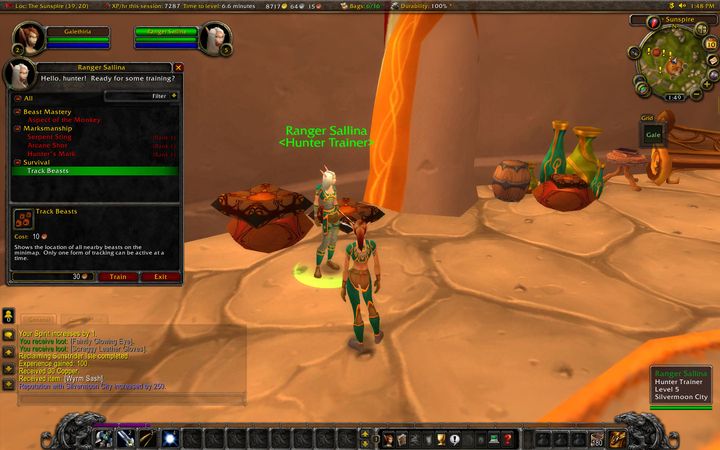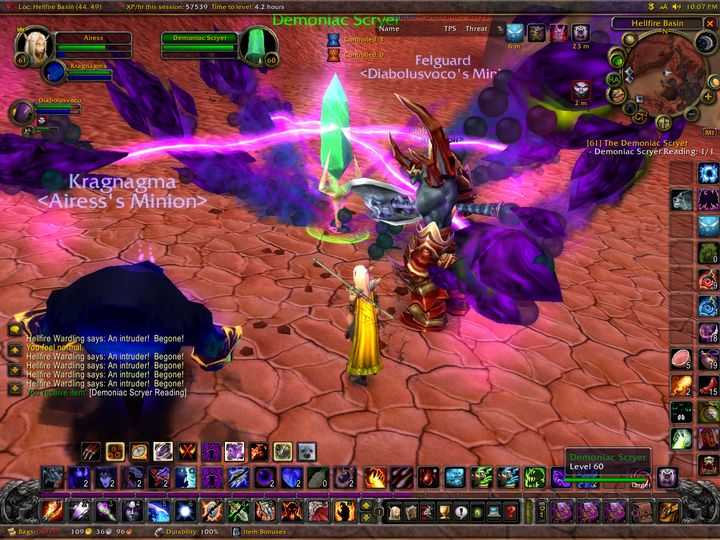Playing to Achieve
Most of the females indicated that they played to socialize like Mandy. For instance, Ally and Natalie ended up playing together in the game, completing quests while helping each other with both the research and writing for their projects. However, unlike Mandy, these females also indicated that achievement was a major reason that they enjoyed playing videogames. While not definitive because I only interviewed six females, this might suggest that more females enjoy playing games for the purpose of achievement than was captured in Yee’s original study. This achievement, however, sometimes took different forms than the pursuit of domination through killing typical in videogames. For instance, Ally was motivated to achieve through building and creation. In her interview, she wrote that growing up, “I really enjoyed playing games like The Sims because I enjoyed designing my own house and having a family that you could take care of.” Her desire to achieve by creating and nurturing, which is the main way to achieve social and economic power in The Sims, is admittedly a more maternal type of achievement, but it is still a form of achievement—one that often goes unrecognized in game design and gaming scholarship where achievement is defined in more masculine terms as the violent domination of the game world and other players. In fact, it was this type of violent achievement that Ally seemed to most dislike in games: “I do not enjoy playing videogames that are violent because I don’t like the feeling of being chased or shot at.”
The other female students, however, defined their achievement in ways that are more common to traditional gaming and masculine definitions of achievement. Specifically, they enjoyed the feeling of accomplishment they experienced when they accrued points, met game objectives, and obtained new levels in a game. For example, Natalie wrote in her interview that growing up “I occasionally played games like Super Mario 64 because it was fun to win and get points and reach new levels. I like having a goal that you have to beat like leveling something.” In fact, Natalie’s drive to achieve in games was mirrored in her scholastic performance as well. Despite being a self-identified dyslexic, she worked diligently to write superior papers, even though she had to juggle putting in long hours writing many drafts with being an athlete who also spent many hours at either games or practice. As also a self-identified over-achiever, she enjoyed setting high goals for herself and then reaching them. This actually was the very reason she enjoyed playing WoW because the game is made up of a series of concrete goals or quests: “I did enjoy playing WoW because I like feeling like I finished something every time I finish a quest.”
Unfortunately though, even while females do play for achievement, their achievement can be thwarted when they lack the gaming literacies needed to be successful in a game. With the exception of Mandy, female students seemed to see WoW as a new gaming genre they had never played before, making no reference in their interviews of playing role-playing games of any kind in their collective pasts. Like all genres, role-playing games follow certain repetitive conventions, or prescribed sets of social practices. If one is already familiar with these genre conventions, it is quite easy to see how each genre convention is transferred from an older game to a new game, so the learning curve is fairly low. However, the game appears much more complex if a player is unfamiliar with these basic genre conventions. In fact, I was amazed by how many of these conventions I considered as so natural that they were invisible to me until I had students who were not familiar with them. 
 A common RPG non-player character, a class trainerFor instance, in role-playing games some of these conventions include the fact that a trainer is always available to purchase more powerful spells and abilities from after a character levels. Also, the point of killing monsters is to loot the monster in order to obtain new gear to wear so that characters can also become more powerful. There are always potions available to make characters more powerful in a battle. In order to play well, players usually need to strategically “pull” monsters to a safe place—using a spell or a long-distance weapon like a gun or a bow to get the monster to come to them—instead of just running into the monster who is usually in a place where the player could potentially attract too many monsters and become overwhelmed. Even the idea of obtaining quests to get objectives in the game was foreign to some students. And this does not even get into the mechanics of gameplay like using hot keys or using the “A, S, D, and W” keys to control characters. And while most of the spells and abilities in the game are fairly limited and straightforward in the beginning, using spells and abilities together gets progressively more complex as more are added after every level.
A common RPG non-player character, a class trainerFor instance, in role-playing games some of these conventions include the fact that a trainer is always available to purchase more powerful spells and abilities from after a character levels. Also, the point of killing monsters is to loot the monster in order to obtain new gear to wear so that characters can also become more powerful. There are always potions available to make characters more powerful in a battle. In order to play well, players usually need to strategically “pull” monsters to a safe place—using a spell or a long-distance weapon like a gun or a bow to get the monster to come to them—instead of just running into the monster who is usually in a place where the player could potentially attract too many monsters and become overwhelmed. Even the idea of obtaining quests to get objectives in the game was foreign to some students. And this does not even get into the mechanics of gameplay like using hot keys or using the “A, S, D, and W” keys to control characters. And while most of the spells and abilities in the game are fairly limited and straightforward in the beginning, using spells and abilities together gets progressively more complex as more are added after every level.
Charlene, unfortunately, was a student who felt thwarted because she was unfamiliar with these role-playing conventions. 
 Game interface for a warlock, including numerous spellsLike Natalie, Charlene also was driven to play games by a desire to achieve and accomplish goals. When asked to describe her perfect videogame, she wrote, “The perfect videogame would have simple tasks to accomplish while having fun . . . this would be entertaining as well as something that people would strive to play due to the fact that they could accomplish levels.” Because both Charlene and Natalie derived so much pleasure from setting and achieving goals, it would seem that Charlene should have enjoyed WoW as much as Natalie. However, this was not the case. Charlene was extremely frustrated at the game mechanics and gaming literacies needed to play WoW successfully, which was exacerbated by the fact that she played a warlock, a more technically difficult character to play because players must control a pet as well as a central avatar. She wrote, “I don’t like games that are very confusing and detailed like WoW. I don’t really understand the point behind the game, whereas with other games such as Super Mario 64, there are defined levels, and once you beat a certain path, you go up a level and it’s completely different from the level you had just beaten.“ So, even though WoW is actually her ideal game—a game in which the player does finish concrete tasks in order to achieve higher levels and gain access to new parts of the game—she was so thwarted in her desire to achieve by the technical aspects of the game that she could not see this.
Game interface for a warlock, including numerous spellsLike Natalie, Charlene also was driven to play games by a desire to achieve and accomplish goals. When asked to describe her perfect videogame, she wrote, “The perfect videogame would have simple tasks to accomplish while having fun . . . this would be entertaining as well as something that people would strive to play due to the fact that they could accomplish levels.” Because both Charlene and Natalie derived so much pleasure from setting and achieving goals, it would seem that Charlene should have enjoyed WoW as much as Natalie. However, this was not the case. Charlene was extremely frustrated at the game mechanics and gaming literacies needed to play WoW successfully, which was exacerbated by the fact that she played a warlock, a more technically difficult character to play because players must control a pet as well as a central avatar. She wrote, “I don’t like games that are very confusing and detailed like WoW. I don’t really understand the point behind the game, whereas with other games such as Super Mario 64, there are defined levels, and once you beat a certain path, you go up a level and it’s completely different from the level you had just beaten.“ So, even though WoW is actually her ideal game—a game in which the player does finish concrete tasks in order to achieve higher levels and gain access to new parts of the game—she was so thwarted in her desire to achieve by the technical aspects of the game that she could not see this.









